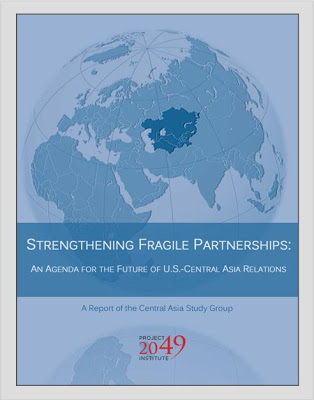
Strengthening Fragile Partnerships: An Agenda for the Future of U.S.-Central Asia Relations
February 17, 2011
Seven Guidelines for U.S.-Central Asia Policy
February 23, 2011By: Evan A. Feigenbaum |
A comprehensive new report from the bipartisan Central Asia Study Group, chaired by former Deputy Secretary of State Richard L. Armitage, and the Project 2049 Institute calls on American and Central Asian leaders to rise to the challenges and opportunities in Central Asia. The report proposes an action agenda on economics, energy, governance, security, social development, and regional cooperation, and places particular emphasis on the importance of reconnecting Central Asian countries to the global economy.
Report author Evan A. Feigenbaum (Director, Asia, Eurasia Group, and Adjunct Senior Fellow, Council on Foreign Relations) shares some insights on the new report “Strengthening Fragile Partnership: An Agenda for the Future of U.S.-Central Asia Relations“:
Why issue such a report now?
Well, for one thing, Central Asia remains fragile and sometimes volatile. Nearly twenty years after the Soviet collapse, ethnic tensions, exacerbated by economic competition, simmer and threaten to destroy the fragile foundations of this multiethnic region. Kazakhstan and Turkmenistan have achieved relative stability. But the explosion of Kyrgyz-Uzbek ethnic clashes around Osh and Jalalabad in June 2010 underscores deeper vulnerabilities and demonstrates just how rapidly violence can escalate in both scope and scale.
Meanwhile, notwithstanding impressive growth rates, most Central Asian economies are weak and underlying fiscal fundamentals are poor. Governance has been only weakly responsive to popular demands and is disproportionately influenced by national elites. The influence of criminal groups has grown across the region. And a combustible mix of corruption, narcotics, poverty, and terrorism threatens all five states in Central Asia.
Forces within Central Asia—as well as neighboring powers—now challenge American interests in the region as never before.
What are those interests? Our group believes they are four:
- To preserve not just the independence of the five Central Asian states but also their ability to exercise sovereign political and economic choices, free from external coercion.
- To diversify transit options, thus reducing the dependence of Central Asian economies on a single market, infrastructure link, and/or point of transit.
- To build institutional capacity, so that states can govern effectively and justly, deliver services, and resist pressure from those who seek to overthrow legitimate institutions; more than one Central Asian state has the potential to fail within the next decade.
- And to reconnect this landlocked region to the global economy, thus increasing the prospects for sustainable economic progress.
But an honest appraisal needs to acknowledge the many shortcomings of twenty years of American effort in pursuit of these interests. To date, and in nearly every respect, the United States has failed to achieve its initial, ambitious, strategic objectives in Central Asia.
Central Asian states have retained their independence—and this has been the first, and most important, objective of U.S. policy. But trade and commercial ties to the United States remain very thin indeed. There is no trans-Caspian oil or gas pipeline, despite nearly two decades of American effort. Millions of dollars spent to encourage transnational water sharing have failed to produce agreement. Democracy promotion efforts have failed utterly, although U.S. assistance has made a difference at the margins with respect to education, civil society, the media, and local governance.
Now, don’t get me wrong: Central Asia is neither the most significant nor most pressing foreign policy challenge faced by any U.S. administration. Yet its fragile and even volatile nature increases the urgency for American action. U.S. policy toward Central Asia requires greater strategic direction.
Our study group considered U.S. interests in Central Asia. On that basis, we propose guidelines for American policy. In key areas, we put forth a bipartisan action agenda aimed at creating a more effective and enduring partnership between the United States and the nations of Central Asia.
This piece was first published here by the Council on Foreign Relations.
Evan A. Feigenbaum is the Director, Asia, Eurasia Group, and Adjunct Senior Fellow, Council on Foreign Relations




